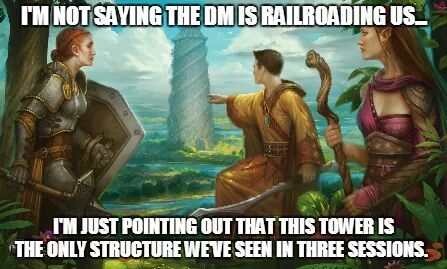Whether or not anyone’s noticed, I’ve been on a hiatus for a while. Like, 9 years “a while”. But over those years I continued to receive questions, especially with the recent resurgence of D&D. I ignore them because they’re all lame technical questions about rules, abilities, spells and the like. And if you’ve read my blog before, you know I don’t care about any of that.
Roleplaying is about roleplaying, otherwise they’d call it boring, and then your grandmother would be playing it instead of canasta. (I don’t know what canasta is, or if it’s an old people game, but it sounds old and boring.)
Fortunately, I finally received a question that I couldn’t pass up. It’s about roleplaying, rules, and their intersection. It comes to us from Cameron (and it’s been edited for clarity):
I played a session with some friends and they kept making stupid, rash decisions without thinking. I know I can straight out attack other party members, but I have high persuasion and charisma. Can I use these skills against the party to get the campaign to go in a different direction? I know D&D is mostly roleplaying and I can’t force people to do something different, but I thought it might be a good way to settle arguments within the party.
The short answer is, yes. If we have skills and abilities represented by dice, we should be able to use those abilities against anything in the Game, including other PCs. The problem lies in the outcome. How another PC reacts or responds is a complex problem, and requires a deep dive into both roleplaying and mechanics.
The first point I’d like to address is the “stupid, rash decisions” part. If you happen know a group of Players that doesn’t make stupid rash decisions from time to time, then get some help, because you’re either delusional or a liar.
The great part about roleplaying is the unknown. Everyone at the table is there to unravel, learn, and explore. (And usually kill.) But the unknown is what captivates. And when only the DM knows the secrets, everyone else is working out of ignorance. That means the Players can only make their best guesses at what the right path is. And more often than not, at least one person is going to guess differently than everyone else. And sometimes no one will be on the same page at all.
How then, do we decide what exactly a stupid or rash decision is in the moment? Perspective is everything, and therein lies the greatest obstacle to Party cohesion. Unless the DM is dropping some serious hints, it can be difficult (but also good fun) to try and puzzle through the right answer. Everyone thinks they have the right answer, and arguing with each other can also be good fun as long as it doesn’t last for an hour. But there’s another problem to address apart from individual perspective, and it’s this: Who’s doing the arguing? The Player or their PC?

This can be difficult to tease out, even for the Player doing the arguing. Sometimes we get lost in our Character, and sometimes our Character gets lost in us. And if one of those people is being dumb, we need to know:
Is my PC stupid or am I?
This is an age-old question dating back to the dawn of roleplaying. Does Dave always make characters with low Intelligence because he’s a big dummy that hides it behind impeccable roleplaying? Or is Dave such an insightful genius that only he could play a dummy with such panache and subtlety?
We may never solve this conundrum without tricking Dave into taking an IQ test, but the point here is that it can be tough to see the difference between when someone is roleplaying and when someone is a pain in the ass.
Good roleplaying should generally be respected and rewarded, even when it annoys everyone at the table, because if everyone else is roleplaying well, then it’s really their Characters that are annoyed, and fake emotions shouldn’t be confused with real emotions. If you’re the kind of person that gets so invested in your Character that you get butt-hurt and angry in real life when you’re angry in fake life, you should just go back to playing text-based RPGs by yourself.
The main point I’m making here is this: everyone should be roleplaying to the best of their ability, and if this is happening, then we need to ask our next big question:
What’s the point of all these dice?
There’s a reason we have dice and rules and character sheets: because we decided sometime around the age of 12 that playing pretend was for babies and we needed structure and rules to continue playing pretend like grown-ass adults.
Without the dice, we have to agree with one another on some vague set of rules, but we all learned as children that this rarely works. It devolves into some version of, “You can’t penetrate my titanium armor with you sword!” or “My fireball is stronger than your castle!”
The dice are an impartial intermediary between us and our desires. The dice are law. The dice, not the Dungeon Master, are our only God.
But there is another, sometimes written, sometimes unwritten rule in roleplaying: the Player’s are always in control of their Character’s actions (unless of course Magic and the like get involved). The DM can’t persuade a PC to do something, because without that agency, we would all feel railroaded down a pre-fabricated path. We are drawn to roleplaying, not just for the mystery and excitement, but also for the control. If that control is taken from us, we might as well just go back to work behind the cash register or cubicle, and let our power-tripping manager continue to crush our souls.

However, just as one PC can choose to attack another PC, they can always attempt to persuade one as well. But there’s an important difference between a physical assault and mental one: a successful persuasion roll should not dictate the losing PC’s actions. What it should do is make one PC realize how damn persuasive their friend is. What happens next is, and should be, left up to roleplaying. There are many questions each PC needs to answer before making a real decision: How much do I respect this other PC? How much do I care about keeping the peace? How invested am I really in this action?
Each of these questions will influence how a PC should react to a well thought out and articulate argument. But even the greatest argument can’t sway someone that’s committed to their path. This is something we all experience everyday on the internet. We formulate the most logical, emotionally appealing, and concise argument on some message board, only to find that the big dummy we’re talking to still doesn’t believe us.
The power of persuasion is not nearly as powerful as the roll of a die might have us believe. So, sure, every DM should let their Player’s roll anything and everything against each other, but we should all remember the limitations of the the human mind, and forgive our fellow Players for being short-sighted
fools.
Besides, no Dungeon Master worth their salt would allow a party to degenerate into constant in-fighting. And if you find yourself in that position, you should ask yourself this: Am I the only one annoyed right now? And if the answer is yes, then maybe you’re the annoying one.


Welcome Back! By the way, you dropped this.
* Holds up a microphone *
Thanks! It’s good to be back!